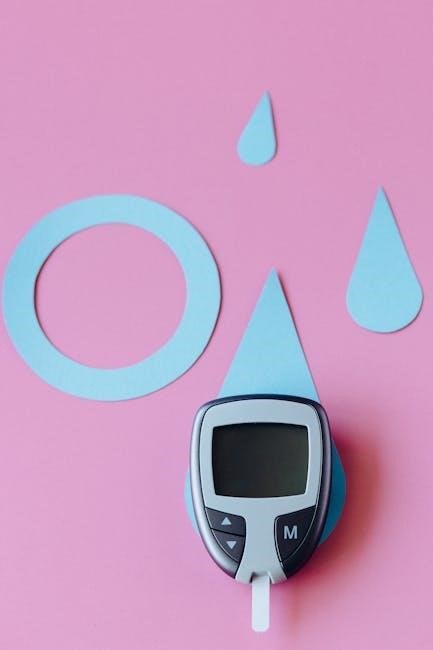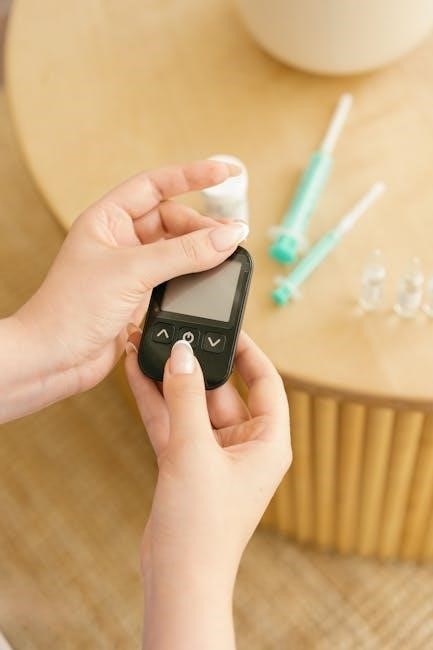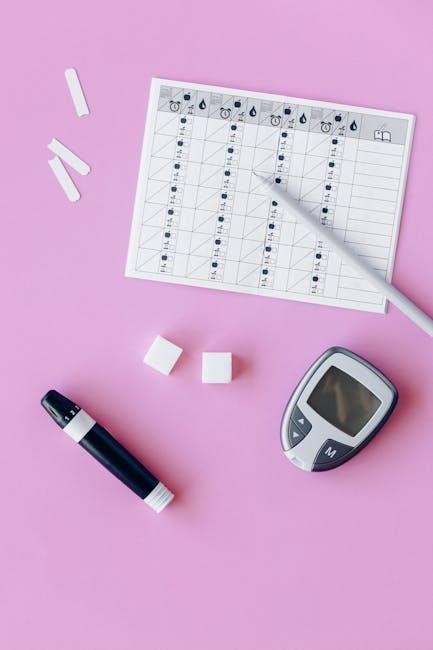
diabetes care plan pdf
A diabetes care plan is a personalized guide created by healthcare professionals to manage diabetes effectively. It outlines strategies for blood sugar monitoring, insulin therapy, and lifestyle adjustments to prevent complications and improve quality of life.

Importance of a Diabetes Care Plan
A diabetes care plan is essential for effectively managing the condition, reducing complications, and improving quality of life. It provides a structured approach to monitoring blood sugar levels, adjusting medications, and making lifestyle changes. Studies show that individuals with a personalized care plan experience better glycemic control and fewer diabetes-related complications. Approximately two-thirds of people with diabetes lack a care plan, highlighting the need for increased awareness and implementation. A well-designed plan involves collaboration between patients, healthcare providers, and family members, ensuring tailored strategies to meet individual needs. Regular updates and reviews of the plan help adapt to changing health circumstances, promoting long-term health and well-being.

Blood Glucose Monitoring
Blood glucose monitoring is crucial for managing diabetes, enabling individuals to track their levels and adjust treatments to maintain target ranges and prevent complications effectively.
Frequency and Targets
Blood glucose monitoring frequency and targets are tailored to individual needs, ensuring optimal diabetes management. Typically, individuals with diabetes are advised to check their levels 4-8 times daily, with specific targets set by healthcare providers. Common target ranges include fasting blood glucose (70-110 mg/dl) and postprandial levels (less than 140 mg/dl). These targets may vary based on age, health status, and treatment goals. Regular monitoring helps identify patterns and prevent complications. Consistently meeting targets reduces the risk of hyperglycemia and hypoglycemia, promoting better overall health. Personalized plans often include adjustments based on lifestyle, medication, and physical activity. Regular reviews with healthcare teams ensure targets remain achievable and aligned with long-term health objectives.
Devices and Techniques
Blood glucose monitoring relies on advanced devices and techniques to ensure accurate readings; Glucometers are the most common tools, offering portable and quick measurements. Continuous glucose monitors (CGMs) provide real-time data, reducing the need for finger pricks. Flash glucose monitors are another option, allowing users to scan a sensor worn on the skin. Proper techniques, such as finger-prick testing and site rotation for CGMs, are essential for accuracy. Regular calibration and maintenance of devices ensure reliable results. These tools empower individuals to track trends and make informed decisions. Healthcare providers often recommend specific devices based on individual needs, ensuring effective diabetes management.
Insulin Therapy
Insulin therapy is a cornerstone of diabetes management, especially for type 1 diabetes, and is often used in advanced type 2 cases. It involves administering insulin via injections or pumps, with dosages and timing tailored to individual needs to maintain blood glucose levels within target ranges. There are several types of insulin, including rapid-acting, short-acting, intermediate-acting, and long-acting, each with distinct onset and duration profiles. Proper technique and adherence to prescribed regimens are crucial for effective glucose control and minimizing complications.
Dosage and Timing
Insulin dosage and timing are tailored to individual needs, considering blood glucose levels, meal patterns, and physical activity. Rapid-acting insulin is taken before meals to manage postprandial spikes, while long-acting insulin provides basal coverage. Dosages are adjusted based on glucose monitoring data, ensuring optimal control without hypoglycemia. Timing varies by insulin type: rapid-acting begins working in 10-20 minutes, short-acting in 30 minutes, intermediate-acting in 1-2 hours, and long-acting lasts up to 24 hours. Personalized plans prevent hyperglycemia and maintain target ranges. Regular monitoring and healthcare provider guidance are essential for safe and effective insulin management.
Types of Insulin
Insulin therapy involves different types tailored to individual needs. Rapid-acting insulin (e.g., insulin aspart, insulin lispro) begins working within 10-20 minutes, peaking in 1-3 hours, and lasts 3-5 hours. Short-acting insulin (regular) starts working in 30 minutes, peaks in 2-4 hours, and lasts 6-8 hours. Intermediate-acting insulin (NPH) has a slower onset, peaking in 4-12 hours and lasting 12-18 hours. Long-acting insulin (glargine, detemir) provides basal coverage for 24 hours with minimal peak. Premixed insulins combine short and intermediate-acting types for convenience. Each type is chosen based on blood glucose patterns, lifestyle, and treatment goals to maintain optimal control and minimize hypoglycemia risks.

Lifestyle Management
Lifestyle management is crucial for diabetes control, focusing on balanced nutrition, regular physical activity, and stress reduction to maintain blood sugar levels and overall well-being.
Physical Activity
Physical activity is crucial in diabetes care, enhancing blood glucose regulation and overall well-being. Regular exercise aids in maintaining healthy blood sugar levels, promotes weight management, and reduces cardiovascular risks. The American Diabetes Association suggests at least 150 minutes of moderate-intensity aerobic exercise, such as brisk walking or swimming, or 75 minutes of vigorous exercise weekly. Incorporating strength training twice a week can improve insulin sensitivity and muscle mass. Even shorter, less intense activities, like daily walks, contribute positively to blood sugar control. Tailoring an exercise plan with a healthcare provider ensures safety and effectiveness, accommodating individual capabilities and health conditions; Consistency in physical activity is key to long-term diabetes management and preventing complications.
Nutrition and Meal Planning
Nutrition and meal planning are cornerstone components of diabetes care, aiming to stabilize blood sugar levels and promote overall health. A balanced diet focuses on portion control, avoiding sugary and high-carbohydrate foods, and emphasizing whole grains, vegetables, lean proteins, and healthy fats. Personalized meal plans, developed with a dietitian, consider individual nutritional needs, lifestyle, and health goals. Regular blood sugar monitoring helps tailor dietary choices, ensuring meals align with target glucose levels. Proper nutrition not only aids in managing diabetes but also supports weight management, heart health, and energy levels. By adhering to a structured meal plan, individuals with diabetes can better control their condition and reduce the risk of complications, fostering a healthier and more balanced lifestyle.
Regular Health Check-Ups
Regular health check-ups are essential for managing diabetes effectively and preventing complications. These visits allow healthcare providers to monitor blood sugar levels, blood pressure, and cholesterol, ensuring targets are met. They also enable early detection of potential issues, such as nerve damage or kidney problems, through screenings like foot exams and eye tests. Adjustments to the care plan can be made based on these evaluations, ensuring personalized and effective management. Routine check-ups foster a proactive approach to health, empowering individuals with diabetes to maintain better control over their condition and reduce long-term risks. Consistent communication with healthcare teams is vital for optimizing care and improving overall well-being.
Managing Hyperglycemia and Hypoglycemia
Hyperglycemia and hypoglycemia are critical conditions requiring immediate attention. Proper prevention, timely interventions, and personalized strategies are essential to maintain blood sugar balance and prevent complications, ensuring better control and well-being.

Hyperglycemia
Hyperglycemia refers to high blood glucose levels, which can occur due to inadequate insulin, poor diet, stress, or physical inactivity. Symptoms include increased thirst, frequent urination, fatigue, and blurred vision. If left unmanaged, it can lead to serious complications like diabetic ketoacidosis or organ damage. Regular blood glucose monitoring is crucial for early detection. Treatment involves adjusting insulin doses, improving meal planning, and increasing physical activity. A diabetes care plan should include strategies to prevent hyperglycemia, such as setting personalized blood sugar targets and outlining emergency interventions. Proper management ensures better control, reduces risks, and improves overall health outcomes for individuals with diabetes.
Hypoglycemia
Hypoglycemia, or low blood sugar, occurs when blood glucose levels drop below normal. It can result from excessive insulin, skipped meals, or increased physical activity. Symptoms include sweating, trembling, dizziness, and hunger. Severe cases may cause confusion or loss of consciousness, requiring immediate intervention. Treatment involves consuming fast-acting carbohydrates, such as juice or glucose tablets, followed by a snack or meal to stabilize levels. Monitoring blood sugar regularly and adjusting insulin or diet can prevent hypoglycemic episodes. A diabetes care plan should outline emergency procedures for hypoglycemia, ensuring quick response and minimizing risks. Proper management is vital to maintain health and prevent complications.

Gestational Diabetes Management
Gestational diabetes mellitus (GDM) develops during pregnancy due to hormonal changes and insulin resistance. Management involves regular prenatal check-ups, blood sugar monitoring, and lifestyle adjustments. Women with GDM may need to follow a tailored meal plan, engage in moderate physical activity, and, in some cases, use insulin therapy. Close monitoring of fetal development and birth planning are essential to ensure a healthy outcome. Healthcare providers work closely with patients to create personalized care plans, emphasizing education on symptoms and glucose control. The goal is to maintain normal blood sugar levels during pregnancy, reducing risks for both mother and baby. Postpartum, women are screened for persistent diabetes, and long-term health monitoring is recommended to prevent future complications.

Patient Education and Empowerment
Patient education is crucial for effective diabetes management, enabling individuals to take control of their condition. A comprehensive care plan includes teaching patients about blood sugar monitoring, insulin administration, and lifestyle modifications. Understanding symptoms of hyperglycemia and hypoglycemia, as well as how to respond, is vital. Education also covers proper nutrition, physical activity, and stress management. Healthcare providers work with patients to set realistic goals and develop problem-solving skills. Empowering patients fosters adherence to treatment plans and improves overall well-being; Regular follow-ups and access to resources ensure ongoing support, helping patients navigate challenges and maintain optimal health. Personalized education tailored to individual needs enhances self-care and reduces the risk of complications, promoting long-term diabetes management success.
A well-structured diabetes care plan is essential for managing the condition effectively, ensuring improved health outcomes and quality of life. By focusing on blood glucose monitoring, insulin therapy, and lifestyle adjustments, individuals with diabetes can maintain optimal control. Regular health check-ups, proper nutrition, and physical activity play pivotal roles in preventing complications. Patient education and empowerment are key to fostering adherence to care plans, enabling individuals to take charge of their health confidently. With personalized approaches and ongoing support from healthcare providers, diabetes management becomes more achievable, reducing the risk of long-term complications and promoting overall well-being.
Leave a Reply
You must be logged in to post a comment.